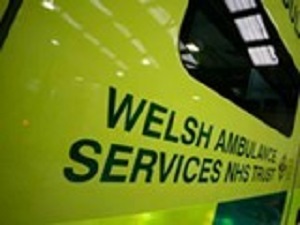Largest digital pen roll out in the NHS to date
Welsh Ambulance Service Trust (WAST) have now implemented a roll-out 1,700 digital pens to ambulance crews across Wales, following a highly successful pilot of Anoto’s digital writing technology with paramedics at the Swansea Ambulance station in 2013.

About us
Each year in Wales, around 500,000 patient clinical records are completed by WAST’s ambulance crews. As well as leaving a copy of the form with the patient at home or hospital a duplicate paper copy of the form is filed by the ambulance clinician at the end of their shift. These forms are transported to the WAST clinical audit department for scanning and data verification.
This current process can take a considerable time and the management team at WAST need more timely clinical data on their interaction with patients in order to share information across the NHS, as well as drive and measure improvements in patient care.
Challenge
Each year in Wales, around 500,000 patient clinical records are completed by WAST’s ambulance crews. As well as leaving a copy of the form with the patient at home or hospital a duplicate paper copy of the form is filed by the ambulance clinician at the end of their shift. These forms are transported to the WAST clinical audit department for scanning and data verification.
This current process can take a considerable time and the management team at WAST need more timely clinical data on their interaction with patients in order to share information across the NHS, as well as drive and measure improvements in patient care.
There is very little change to current working practices with the introduction of digital pens, which is one of the reasons that the technology was chosen. Each team will be equipped with an Anoto digital pen, and they will complete the patient clinical record on the ambulance as per normal practice.
At the end of the patient encounter the crew will still leave a paper form with the patient; however there will now be no second duplicate copy to post back at the station. Instead the handwritten entries on the form are stored securely on the paramedic’s encrypted digital pen. These will be transferred instantly to the clinical audit department as soon as they dock their digital pen at the hospital or back at the station at the end of their shift.
Solution
Commenting on this decision, Richard Lee, head of clinical services at WAST said: “Digital Pens were the most popular option with our paramedic staff. Our staff are focused on delivering care to their patients and need to be able to keep accurate records of observations taken or medications administered. We needed a way of capturing data which was fast and easy so that it doesn’t distract from the staffs primary focus on the patient”.
There is very little change to current working practices with the introduction of digital pens, which is one of the reasons that the technology was chosen. Each team will be equipped with an Anoto digital pen, and they will complete the patient clinical record on the ambulance as per normal practice.
At the end of the patient encounter the crew will still leave a paper form with the patient; however there will now be no second duplicate copy to post back at the station. Instead the handwritten entries on the form are stored securely on the paramedic’s encrypted digital pen. These will be transferred instantly to the clinical audit department as soon as they dock their digital pen at the hospital or back at the station at the end of their shift.
Future developments under consideration include integration of the Anoto digital pen solution with an all-Wales Emergency Department system and also on transfer of digital pen data from ambulances on route using the Vodafone mobile network.
Benefits
“Digital pen-technology will drive significant improvements in our reporting capabilities and the way we measure the quality of the care we provide. We know that these devices are easy for our staff to use, and still allow the ambulance crew to focus on their patients rather than having to stare at a computer screen. It will also enable us to cut our use of paper by 50%”.